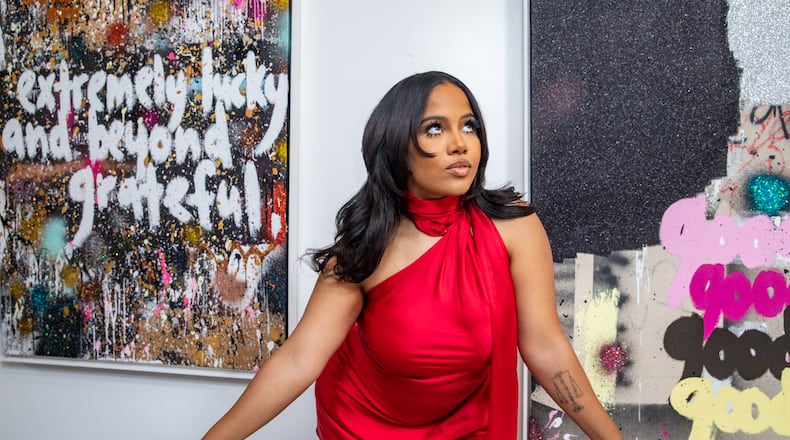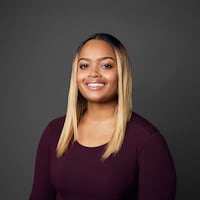On Billie Holiday’s 1942 track “God Bless the Child,” both the earnest mourning of a better life that was never had and the spiritual bliss for the one who attains it blares like a sermon on Sunday morning.
Holiday recorded the song almost two decades before her death at the age of 44. The jazz great revealed in her 1956 autobiography, “Lady Sings the Blues,” that she started writing “God Bless the Child” after her mom refused to give her a loan (“God bless the child that’s got his own,” she warns). The roughly three-minute track is steeped in bitterness; its blues anchored in the history of Black people leaning on religiosity for the life they couldn’t have in reality.
In 1976, the song was inducted into the Grammy Hall of Fame, and it’s ranked the 58th “Song of the Century” by the Recording Industry Association of America and National Endowment for the Arts. (Judy Garland’s 1939 classic “Over the Rainbow” clinched the top spot.)
As a child living in D.C., Baby Rose remembers hearing her Grandma Rose (from whom she created her stage name) play the song on the piano, fueling Rose’s love for the instrument with hopes of making a song as honest as “God Bless the Child” or as hopeful as “Over the Rainbow.” Today, the triumphant bluesy contralto of the Grammy-nominated singer harkens to the likes of Holiday and Nina Simone.
“‘Strange Fruit’ and ‘Baltimore’ — records like that that are politically charged, records that really represented the times,” the 28-year-old said during a phone call in May from her home in Lilburn. “Also, the way they spoke about love, the way they sang about love, their woes with mental illness, the demons that they fought so vulnerably that bled into their music. Things like that made me feel very empowered to tell my story in my own way. They’re my ancestors.”
Calm amid a storm
Baby Rose’s honeyed, raspy tone can both seamlessly fit into the weekly lineup of a 1950′s jazz club and lead the modern landscape of genre-less Black artists willing to test the margins of the R&B/soul standard that Black singers are boxed in. It’s a style that has made Baby Rose one of the most exciting voices in music since appearing on Dreamville’s “Revenge of the Dreamers III” in 2019.
With her latest album, “Through and Through,” the singer wanted to create a body of work that not only honored the Black musical traditions that raised her, but furthered the expansive style of Baby Rose’s blues that’s a source of divine healing for herself and others.
“I treated this record as if this was the last thing I’d put out, I (would) want this to be the sound,” she said. “I wanted it to sound like an offering. I wanted it to sound deeper than just me talking to the listener, but me talking to God and really just showing what I’ve learned; these are the things that I’ve gone through in such a smooth way that I don’t know how.”
Credit: Jenni Girtman
Credit: Jenni Girtman
It’s a sunny Wednesday afternoon in April — the start of rush hour traffic in Atlanta — and Baby Rose is getting the finishing touches of her makeup done at the Midtown home of a friend. She’s running late for a video shoot. Her hair is pinned up and bags of clothes fill the floor. Rose came into town the previous night and will leave on the next one. She has a busy evening ahead of her: beat traffic to get to the West End within the next hour, film scenes for the video throughout the night, and prepare for a photoshoot after that. “Through and Through” drops the following week, which she’ll support with a tour the following month. The soothing rasp in her voice is as inviting as if none of those things matter. She remains present.
Rose approaches the current moment with the ease and comfort of a warm hug after a long day. She’s the calm amid the storm.
“I know that it’s hectic,” she said. “I know that it gets very worrisome, but I do believe that everything is working out for me. Nothing is happening to me. It’s happening for me.”
‘She has an old soul in her’
Baby Rose was born Jasmine Rose Wilson in Washington, D.C., the place that jazz greats like Duke Ellington and newer soul artists like Ari Lennox call home. The area also birthed U. Street, which was considered a premier hub for Black culture and nightlife during the early 20th century before Harlem, New York. It’s this lush music history that surrounded Rose. She grew up listening to Donny Hathaway and taught herself how to play the piano at age 11. Her mom and manager, Joyce McClain, was a member of Black Butterfly, a former girl group she formed with high school friends in the 1980s, and she owned an independent record label, called J Joints, in the 1990s.
Rose’s maternal great-aunt Emma sang in the church and taught Rose gospel hymns, and her paternal grandma (Grandma Rose) played piano in the church.
“She has an old soul in her,” McClain said about her daughter. “When she was singing, you always thought she was older than what she was, you know, because the tone of her voice and the richness of it.”
As a single mom, McClain wanted to nurture the passions of Rose and her younger brother Xavier, so when Rose decided to pursue music at an early age, McClain wanted to be present for every part of it. When a family member found a piano on the side of the street and donated it to Rose, she wanted to paint it red as a nod to one of her favorite artists at the time, Elton John. So, McClain took her children to Home Depot to get red paint so her daughter could have what she wanted. That was the piano Rose used to teach herself how to play.
Being a single mom living on a tight budget, McClain wasn’t able to pay for piano lessons, but that didn’t deter her from investing in her daughter as much as she could.
“As she got older, she never really, decided, ‘Oh, this is not something I wanna do.’ “Matter of fact, she dug in deeper, you know, into it,” said McClain.
When Rose was 11, the family moved to Fayetteville, North Carolina, for a slower lifestyle and to live closer to family. One of Rose’s first performances was at a talent show in junior high school. It was then that she noticed people paying attention to her.
“I’ve always loved my voice, but I knew it was different,” Rose said. “I was teased for how low it was... but that changed after the talent show. The general consensus was, ‘Oh yeah, she can really sing. She’s a singer.’ These are things I’ve always known about myself, but I was just waiting for everyone to catch up.”
Once she moved to Atlanta for college around 2013, she began to pursue music seriously. She was originally set to attend Spelman College to study biomedical engineering, but the family couldn’t afford it. Instead, Rose attended Georgia Gwinnett College for sociology. Her mom and brother soon joined her in Georgia.
A turning point
In 2016, a life-altering event made Rose reconsider her music dreams. She questioned whether she wanted to give up on them entirely. Her mother was diagnosed with stage 3 colon cancer and wound up on life support in the intensive care unit.
Instead, Rose began to pursue her passion with the yearning of a daughter who simply wanted to make her mom proud.
“We didn’t know if she was going to make it ... My mom’s been taking me to the studio since I was 12 years old, so I just felt guilty because from all of these experiences and all of these lessons I’ve learned, I don’t have anything to show for it,” said Rose. “I don’t have anything out in the world.”
Following surgery and six months of chemo, McClain was cancer-free. Shortly after, in 2017, Rose dropped her debut project, “From Dusk Til Dawn.” The nine-track project is a neo-soul-inspired showcase of Rose’s velvety texture that can easily soundtrack a long car ride.
She dropped more singles the following year and captured the attention of rapper J. Cole’s Dreamville imprint, which invited her to record the label’s Grammy-nominated 2019 compilation album “Revenge of the Dreamers III.” The album introduced Rose’s effortless ability to make her anachronistic voice sound both fresh and timeless in today’s streaming era of music. Since then, she’s toured with Ari Lennox and has a song on the “Creed III” soundtrack. In 2020, she dropped her debut album “To Myself,” which wields blues and folk to unearth the depths of her innermost fears of love and heartache.
For “Through and Through,” Rose searched to heal from those feelings and translate the lessons she’s learned along the way for listeners. She was inspired by culture-shifting albums like Lauryn Hill’s “The Miseducation of Lauryn Hill,” Pink Floyd’s “The Dark Side of the Moon” and Stevie Wonder’s “Songs in the Key of Life”. The result is an 11-track powerhouse collection of songs that feel as intimate as if Rose is reading directly from her journal entries. Through and through.
That journey reaches a climax on “Stop the Bleeding,” a glorious introspection on the stifling cycle of self-sabotage. Rose’s gritty tone sounds so aching that her devotion to healing her inner child becomes more potent with each note.
“It was just this idea of really releasing everything in me,” she said. “I’m so grateful I was able to put it under a bed of piano and strings. I’ve always dreamed of making a standard like an ‘Over the Rainbow’ (type of) song. I have to tell myself to remember who you are, remember who you want to be and remember what got you here. I deserve good things. I deserve the best of things, and if there’s ever something I want people to take away from me it’s that they deserve the best, too.”
Finding community in Atlanta
Amid the hectic schedule and Atlanta traffic, Baby Rose arrives at her music video shoot on time. The video is set at Atlanta visual artist Jeremy Brown’s studio at The Met on Murphy Avenue. The video in question? “Dance With Me,” the third track on “Through and Through.” The rush of four outfit changes seems unwieldy, but she tackles them all with her mom by her side.
“Mom!” she calls out often. She doesn’t do it in an unruly manner. Instead, it’s simply the type of yell of a daughter who wants her mom close by because she knows how it feels when mom can’t be there anymore.
“I watered that seed,” her mom said.
Rose’s commanding presence throughout the shoot immediately distracts from the afternoon’s turbulence. She forms scenes in her head and vocalizes them before transforming into the character of a woman who’s trying to hold on to a relationship that’s clearly runs its course. The yearning blues of the track becomes more animated with each take, thanks to director Eric Saulsberry, who helped create the video’s concept. “Dance With Me” is his first music video.
Credit: Jenni Girtman
Credit: Jenni Girtman
Saulsberry met Baby Rose last year on social media after the artist posted a callout for videographers in Atlanta. He credits her faith in him for being paramount to his career. Although he was a bit nervous filming the video, Rose’s calming presence eased his anxiety.
“She really believes in you ... it almost feels like two friends just trying to create something cool together,” he said.
Rose is always looking for ways to give back to Atlanta’s creative community that helped her find her voice. Her first sold-out show was here, and this is where she made most of her earlier projects. In fact, the city played a pivotal role in molding “Through and Through.” The chorus on “Power,” the album’s third track, was recorded in 2020 during a music camp Rose hosted at Midtown’s Astro Studios. For Rose, the camp provided a salient reminder of the power of community, which is the thesis of “Power.” (”We do need people,” she affirms. “We do need connection.”)
“Atlanta is where I started to really understand who I am outside of the noise and who I really want to be. That initial reaction happened in Fayetteville, but (there) ... I felt more like a voice and not an author, not a writer, not the storyteller that I am today. I found a community (in Atlanta) that really started to see me for who I am and uncover my potential that really let me know that, ‘Yeah, we might be over here making trap beats or whatever, but I see you as a Nina Simone person.’”
Today, Rose splits her time between L.A. and Atlanta, but the latter will always be a guiding force in her career. The songwriter will stop in Atlanta Sunday, June 4, for a co-headlining tour titled “Through the Soul” with budding R&B singer Q. Although she doesn’t like to think too heavily about anything outside of the present moment, she knows Atlanta will be a part of her future.
“It’s just about really finding balance in where I am and being able to recognize how much I’ve grown, being able to recognize the ways I’ve helped others grow and celebrating the things I have. The goal for me is being able to sustain a beautiful long career that takes me around the world and shows me different things, grows me in different ways and pushes me to heights that help raise the standard of music overall to a frequency of love and honesty.”
God bless the child that’s got her own — and leading the way for others.
CONCERT PREVIEW
Baby Rose and Q. Through the Soul Tour. 8 p.m. Sunday, June 4. $25. Terminal West, 887 W. Marietta St. NW C, Atlanta. terminalwestatl.com.
About the Author
The Latest
Featured





